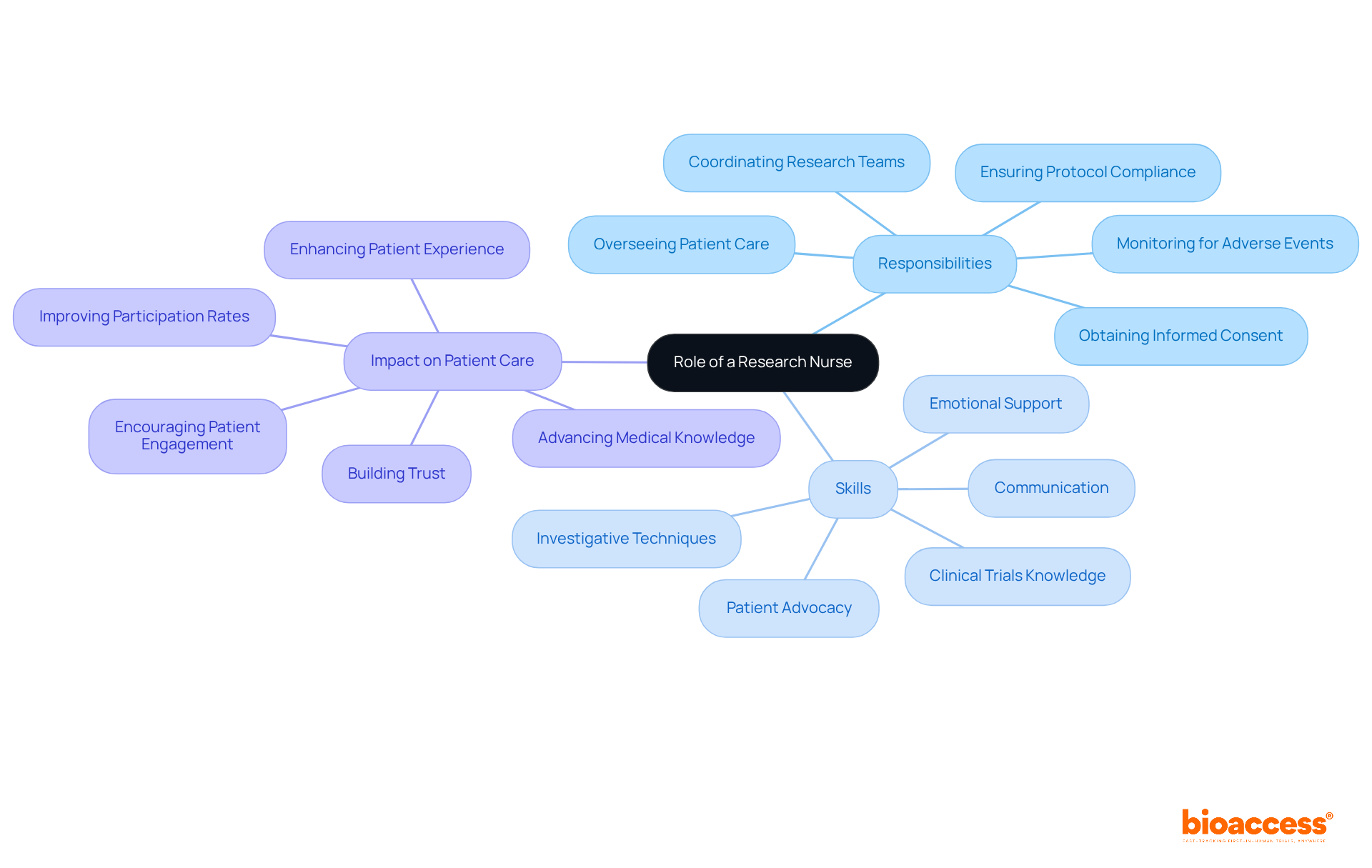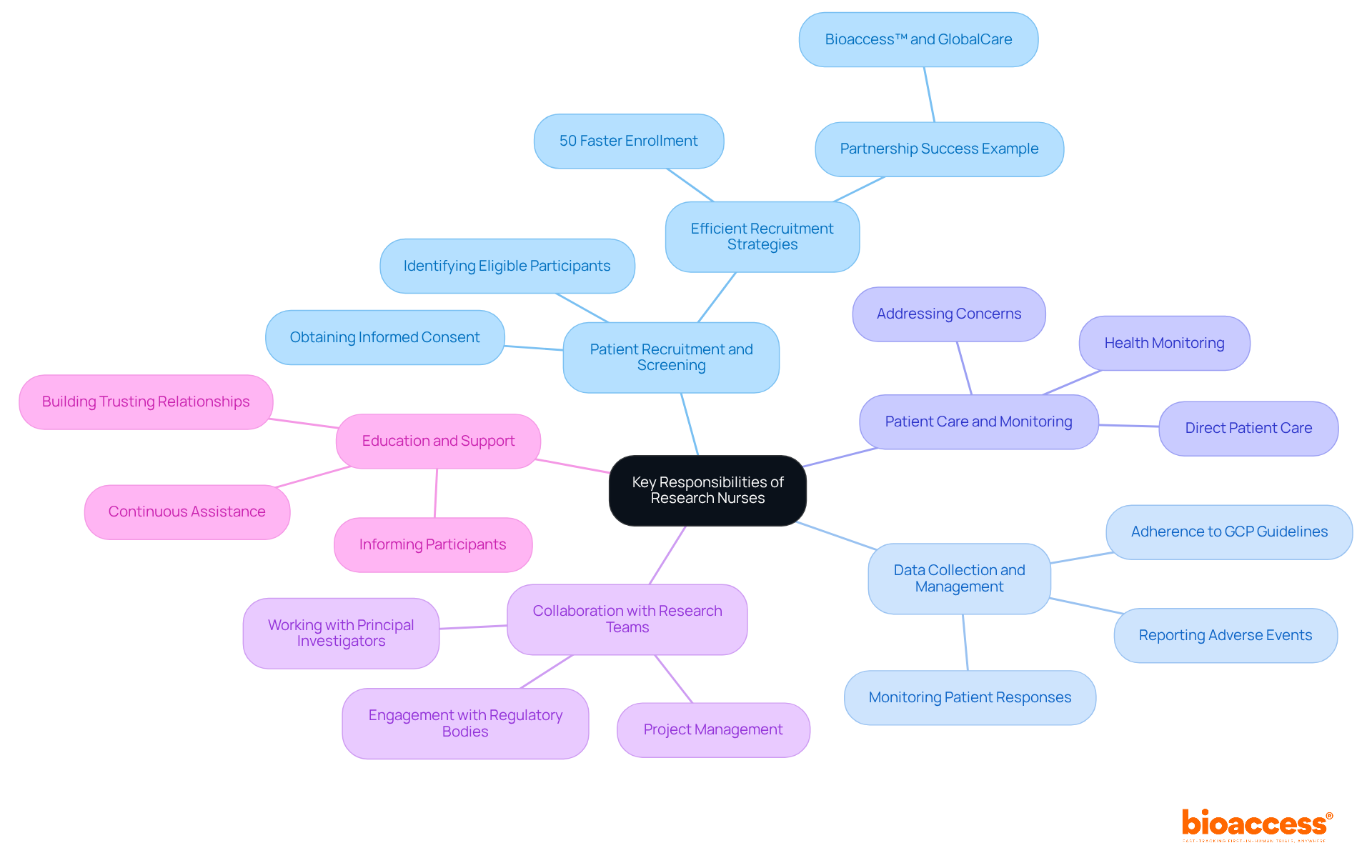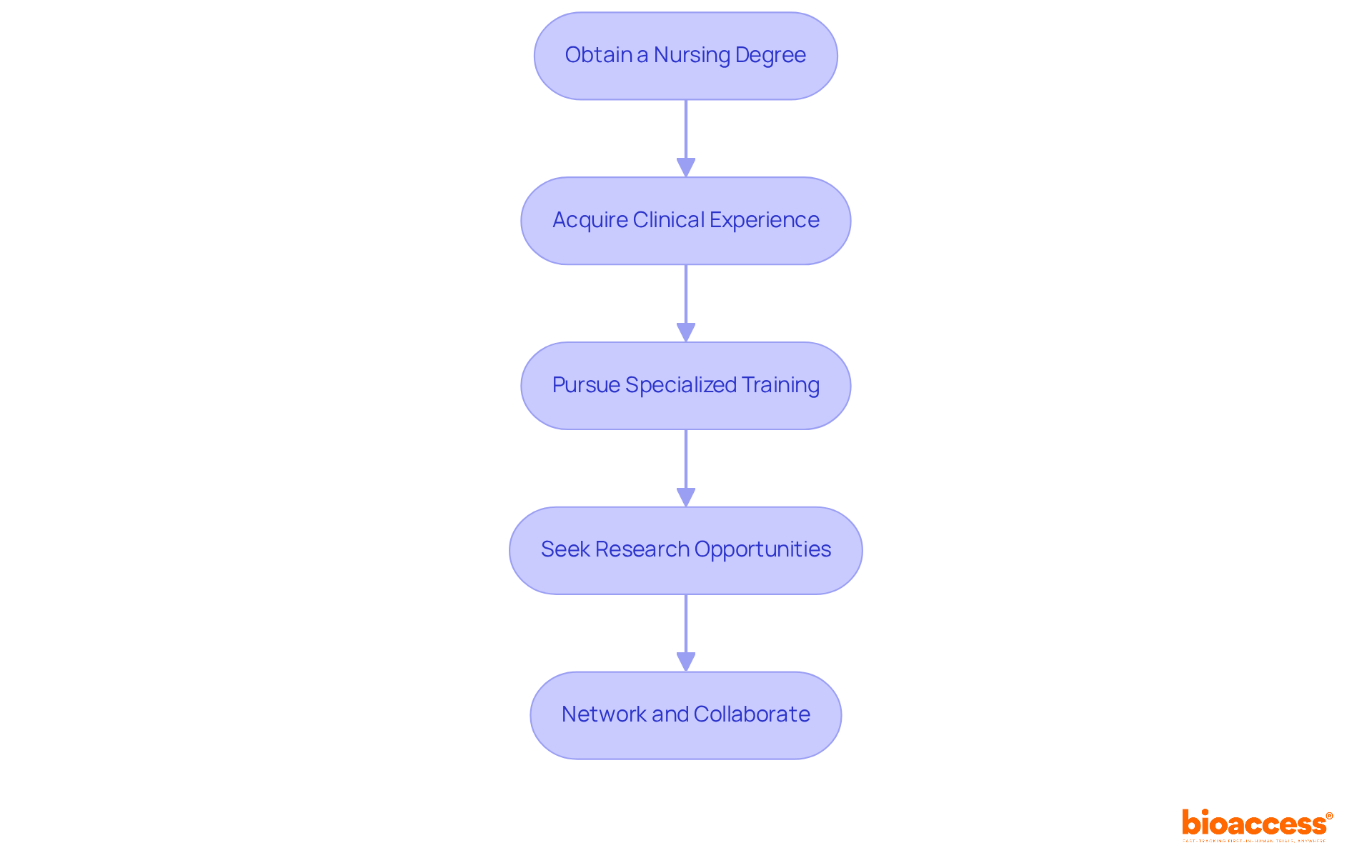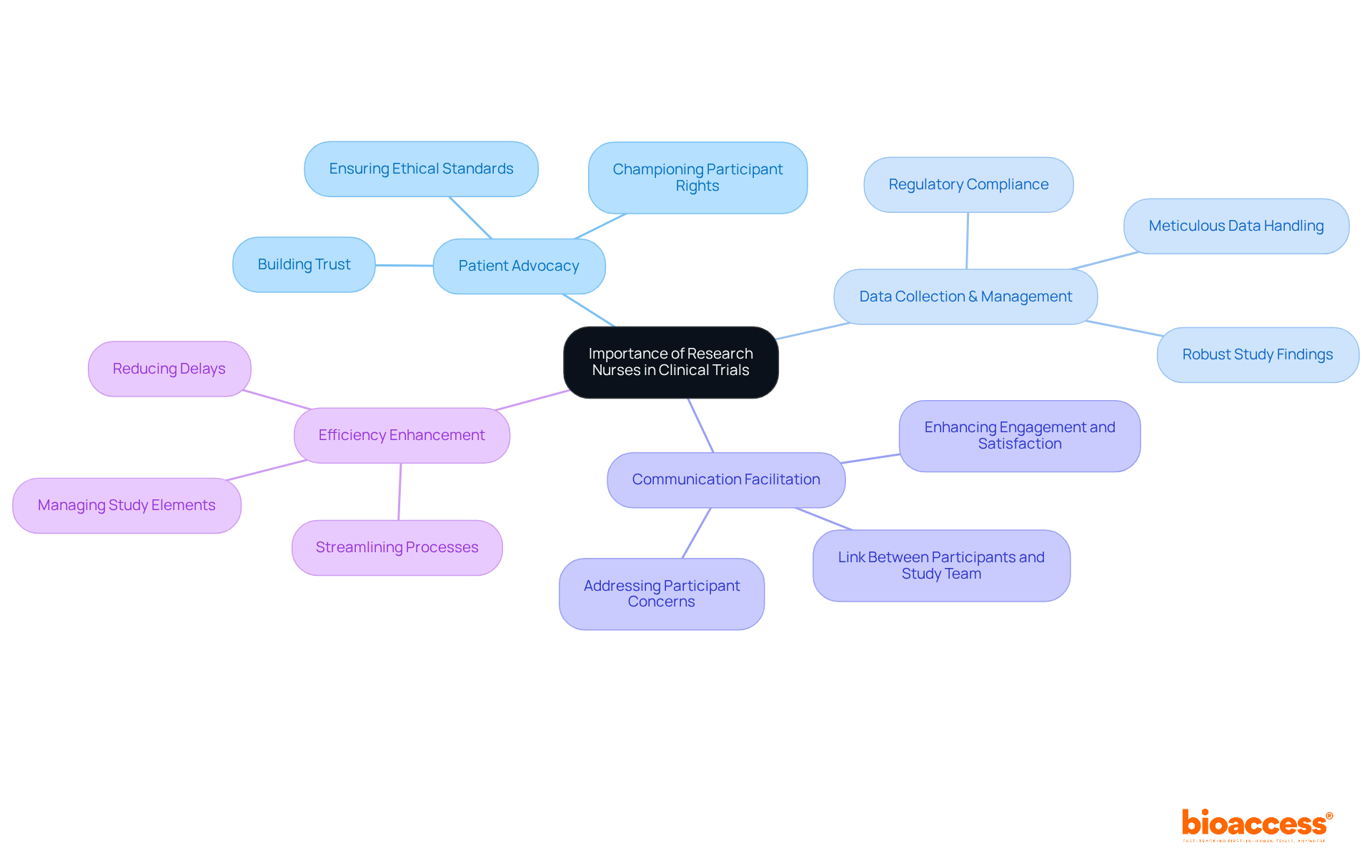


Research nurses are essential to the success of clinical trials, overseeing patient care, ensuring compliance with study protocols, and serving as a vital link between participants and the research team. Their responsibilities encompass:
This multifaceted role not only enhances participant engagement but also safeguards the integrity of the research process. Ultimately, their contributions are pivotal in advancing medical knowledge and improving patient outcomes.
Research nurses serve as the backbone of clinical trials, seamlessly merging patient care with essential investigative processes. Their unique expertise not only ensures adherence to study protocols but also enhances participant experience, fostering trust and engagement.
However, despite their critical role, many remain unaware of the specific responsibilities and impact of research nurses within the healthcare landscape.
What challenges do they face in balancing patient advocacy with rigorous study demands? How do their contributions shape the future of medical research?
These questions underscore the necessity of recognizing and supporting the vital work performed by research nurses.
Nursing professionals specializing in studies are indispensable in medical investigations, especially when considering what research nurses do within the framework of extensive health study management services. They oversee patient care while ensuring strict adherence to study protocols, highlighting what research nurses do as a crucial link between the care team and study participants. This role fosters efficient communication and guarantees that the study's objectives are achieved, especially during critical phases such as feasibility studies, site selection, and setup.
What do research nurses do? They combine their unique blend of nursing expertise and investigative techniques to deliver exceptional patient care while meticulously gathering essential information for trials. This dual commitment to patient welfare and integrity in studies highlights what research nurses do, setting clinical professionals apart from other nursing roles and underscoring their significance in advancing medical research.
Understanding what research nurses do is important, as their role extends beyond mere protocol compliance and they profoundly impact patient care within clinical trials. By providing comprehensive support, what research nurses do is enhance the overall experience for participants, ensuring that their needs are met throughout the study process. This includes obtaining informed consent, monitoring for adverse events, and offering emotional support, which fosters trust and encourages patient engagement in studies. In understanding what do research nurses do, their involvement is crucial in navigating the complexities of setup and compliance evaluations, ensuring that all regulatory standards are met, including import permits and the nationalization of investigational devices.
Experts in the field emphasize what research nurses do as a vital role in conducting medical experiments. Their involvement not only elevates the quality of care provided but also reinforces the integrity of the investigative process, which is essential in understanding what do research nurses do. As noted by healthcare study leaders, the presence of skilled and compassionate medical staff can significantly influence patient participation rates, as individuals are more likely to engage in studies when they feel supported and informed by trustworthy healthcare providers. This highlights what research nurses do in bridging patient care and investigation, ultimately contributing to the advancement of medical knowledge and patient outcomes, while also fostering global collaboration and economic growth within local communities.
To effectively fulfill their responsibilities, study professionals must understand what do research nurses do, which includes having specific competencies such as a strong grasp of experimentation, excellent communication skills, and advanced investigative capabilities. These qualifications are critical for understanding what research nurses do in overseeing research studies and ensuring participant safety. Furthermore, the statistic that only 5% of eligible patients participate in studies underscores the challenges faced in recruitment, emphasizing the crucial role of study coordinators in tackling these hurdles. Their responsibilities, which include being caregivers and advocates for subjects, coordinating research teams, and educating participants, illustrate what do research nurses do to enhance the quality of medical research and patient care.

Research professionals are pivotal to the success of medical studies, undertaking a variety of responsibilities that ensure both participant safety and the integrity of the study. Their primary functions encompass:
Patient Recruitment and Screening: Research nurses play a crucial role in identifying and recruiting eligible participants for clinical trials. They ensure informed consent is obtained, and that participants fully comprehend the study's purpose and procedures. Effective recruitment strategies can significantly expedite the enrollment process, achieving results that are often 50% faster than traditional methods. A notable example of this efficiency is the partnership between bioaccess™ and GlobalCare Clinical Trials, which has resulted in a remarkable reduction in recruitment time and an increase in subject retention rates exceeding 95% in Colombia.
Data Collection and Management: These professionals meticulously collect and document data, strictly adhering to Good Clinical Practice (GCP) guidelines. This includes monitoring patient responses and promptly reporting any adverse events, which is essential for maintaining the study's credibility.
Patient Care and Monitoring: Providing direct patient care is a fundamental aspect of their role. Research staff continuously monitor participants' health throughout the study, addressing any concerns or complications that may arise, thus ensuring participant safety and comfort.
Collaboration with Research Teams: They work closely with principal investigators, regulatory bodies, and other healthcare professionals to ensure that the study is conducted ethically and efficiently. This collaboration is vital for navigating the complexities of clinical studies, including compliance evaluations, study setup, and project management—crucial elements of comprehensive clinical study management services.
Education and Support: Research professionals inform participants about the study, offering continuous assistance and responding to inquiries to enhance retention and adherence. Their ability to cultivate trusting relationships with participants is critical for successful recruitment and study completion.
Citations from seasoned research professionals frequently highlight the significance of what research nurses do, emphasizing that their role extends beyond data gathering to fostering connections and ensuring participant welfare throughout the trial process. For instance, one healthcare professional remarked, "Our job is to ensure that participants feel valued and informed every step of the way." This perspective underscores the importance of healthcare professionals in the system and their commitment to patient care, ultimately contributing to economic development and healthcare enhancement in the regions where they operate.

To embark on a career as a research nurse, individuals typically follow these essential steps:
As healthcare professionals note, "Every caregiver was attracted to the profession due to a desire to care, to serve, or to assist." The journey to becoming a clinical investigator involves understanding what research nurses do, as it encompasses more than just education; it requires dedication and a commitment to advancing medical understanding. This path often demands ten years or more of education and experience, highlighting the importance of perseverance in this rewarding field. Furthermore, to attain certification as a medical study professional, candidates must demonstrate 3,000 hours of relevant work in human subject studies within the past decade.

Research nurses are pivotal to the success of clinical trials, fulfilling several critical roles:
To maintain the integrity of study findings, one key aspect of what research nurses do is meticulous data collection and management. Their attention to detail is crucial for regulatory approval and the advancement of scientific knowledge, as studies with robust data are more likely to yield credible results.
To understand what do research nurses do, it's important to recognize that they facilitate communication as a vital link between participants and the study team, addressing concerns and ensuring that participants are well-informed about the study processes. This role enhances participant engagement and satisfaction, which can positively influence study outcomes.
What do research nurses do? They enhance study efficiency by using their knowledge in overseeing research studies, which contributes to streamlined processes, significantly reducing delays and improving overall study timelines. Study coordinators are skilled at managing different elements of experiments, including feasibility assessments, site choice, compliance evaluations, and setup processes, which is crucial for sustaining progress in investigative initiatives.
By actively participating in trials, nursing professionals play a crucial role in advancing medical knowledge and enhancing patient outcomes, demonstrating exactly what do research nurses do. Their involvement is instrumental in the development of new treatments and therapies, ultimately benefiting the broader healthcare landscape. The competencies required for CRNs, including communication and coordination abilities, are vital for their effectiveness in these roles. Furthermore, their contributions to comprehensive clinical trial management services not only enhance the quality of research but also support local economies through job creation and healthcare improvement.

Research nurses play a pivotal role in clinical trials, acting as the essential link between patient care and medical research. Their unique blend of nursing expertise and investigative skills enables them to deliver exceptional patient care while meticulously gathering and managing crucial data for studies. This dual commitment highlights the significance of research nurses in advancing medical knowledge and ensuring the integrity of clinical investigations.
Throughout this article, we have emphasized the key responsibilities of research nurses, including:
Their advocacy for patient welfare, adherence to ethical standards, and ability to foster trusting relationships with participants significantly enhance the overall quality of clinical trials. By ensuring that participants feel supported and informed, research nurses not only improve patient engagement but also contribute to the success of the studies they oversee.
The importance of research nurses extends beyond individual trials; their work drives advancements in healthcare and supports local economies. As the demand for innovative treatments increases, the role of research nurses becomes ever more critical. For those contemplating a career in this field, understanding the steps to becoming a research nurse is essential. This path necessitates dedication, specialized training, and a commitment to enhancing patient outcomes. Embracing the challenges and rewards of this profession is vital for those aspiring to make a meaningful impact in the domain of medical research and patient care.
What is the role of a research nurse?
Research nurses specialize in overseeing patient care within medical studies, ensuring adherence to study protocols and serving as a crucial link between the care team and study participants.
What are the primary responsibilities of research nurses?
Research nurses combine nursing expertise with investigative techniques to provide exceptional patient care, gather essential information for trials, obtain informed consent, monitor for adverse events, and offer emotional support to participants.
How do research nurses impact patient care in clinical trials?
Research nurses enhance the overall experience for participants by ensuring their needs are met throughout the study process, fostering trust, and encouraging patient engagement.
What specific competencies do research nurses need?
Research nurses require a strong understanding of experimentation, excellent communication skills, and advanced investigative capabilities to effectively oversee research studies and ensure participant safety.
Why is the presence of research nurses important in medical experiments?
Skilled and compassionate research nurses can significantly influence patient participation rates, as individuals are more likely to engage in studies when they feel supported and informed.
What challenges do research nurses face in recruitment for studies?
Only 5% of eligible patients participate in studies, highlighting the challenges in recruitment that research nurses and study coordinators must address to enhance participation.
How do research nurses contribute to the advancement of medical knowledge?
By bridging patient care and investigation, research nurses help elevate the quality of care provided and reinforce the integrity of the investigative process, contributing to better patient outcomes and global collaboration.